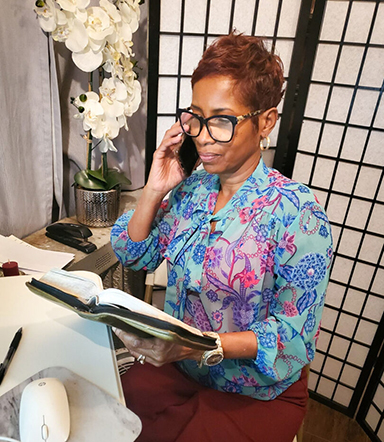NNPA Newswire
Cynthia White would rarely go more than a few days without knocking on a door or
visiting a Bible student as part of her volunteer ministry.
That abruptly changed in the spring of 2020 when Jehovah’s Witnesses suspended their in-person public ministry, meetings, and large conventions.
Two years later, the Philadelphia resident is busier than ever.
“I enjoy doing my ministry by letter and telephone! People are more conversational. I think because of everything people have gone through, they’re opening up and expressing themselves more,” observed the volunteer Bible teacher.
Having endured the loss of her mother to COVID-19, White strives to comfort others facing challenges.
“When I write my neighbors, I put myself in their shoes. I want to share with them what has helped me to feel better,” she said.
With this historic change, the number of Jehovah’s Witnesses grew 3 percent in the United States in 2021 alone, matching the most significant increase for the organization over the past decade and the second-largest percentage increase since 1990.
“Staying active in our ministry while remaining safe has had a powerful preserving effect on our congregants and communities,” said Robert Hendriks, U.S. spokesman for Jehovah’s Witnesses.
“The wise decision not to prematurely resume in-person activities has united us and protected lives while comforting many people in great need. The results speak for themselves.”
For congregants like Cynthia White, the virtual pivot has meant trading her bookbag for a desktop computer and smartphone, and a Bible-based literature display for cards, pens, and stamps.
Her tools have changed, but her message is the same. She regularly shares scriptures with dozens of community members and conducts free Bible courses via Zoom.
Last year, the international organization reported all-time peaks in the number of people participating in their volunteer preaching work, increased attendance in Zoom meetings and more than 171,000 new believers baptized.
In the past two years, more than 400,000 have been baptized worldwide.
Some whose ministry or attendance at religious services had slowed because of age and poor health said they feel reenergized with the convenience of virtual meetings and a home-based ministry.
Like many octogenarians, Sarah Fuoco, 88, deals with memory loss and diminished energy. Yet she and her 81-year-old husband, Joseph, have been given the nickname “the dynamic duo.”
The Fuocos use Zoom to worship twice a week with their Hollis, New Hampshire, congregation and regularly join online ministry groups to comfort neighbors and family through phone calls, letters, texts, and email.
“What could have been quite a disadvantage, we’ve made into an advantage,” Joseph Fuoco said. “The fact that we can work right from home is a great advantage. I’m happy with it.”
By sharing the Bible’s hope remotely, the fewer than 3,000 Jehovah’s Witnesses in
Alaska can rapidly preach across the 586,000 square miles of their sparsely populated state.
“We’re talking to more people in a day than we did in a month,” said Marlene Sadowski of Ketchikan.
The official website of Jehovah’s Witnesses, translated into more than 1,000 languages, has also leveraged the organization’s outreach.
After starting a free self-paced Bible course on jw.org in December 2019, Lisa Owen requested a free, interactive Bible study over Zoom.
She was one of nearly 20,000 baptized as one of Jehovah’s Witnesses last year in the United States in private settings, including backyard swimming pools, tubs and even rivers.
“JW.ORG gave me somewhere to learn, somewhere to land, and to start living the way God wants me to. It taught me so much,” said Owen of Moriarty, New Mexico.

